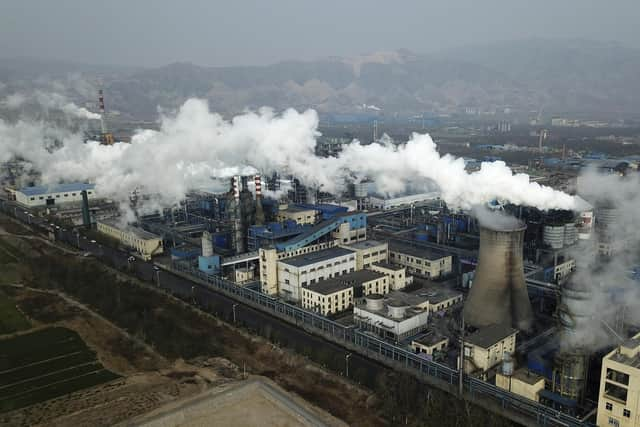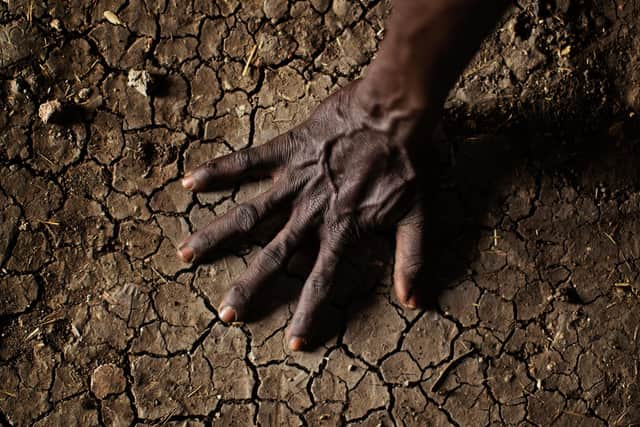Climate change: Major new United Nations IPCC report says it is 'now or never' to limit global warning
The latest in a series of reports from the Intergovernmental Panel on Climate Change (IPCC) – Climate Change 2022: Mitigation of Climate Change – sets out the actions needed to tackle the environmental crisis.
It is the third instalment of the sixth assessment report, an overarching analysis of the world's knowledge on climate change, and the first of its kind since 2014.
Advertisement
Hide AdAdvertisement
Hide AdThe first part, released in August 2021, looked at the physical basis of climate change and concluded that human activities are unequivocally driving global warming.


It was labelled a “code red for humanity” by UN secretary-general Antonio Guterres.
The second report, published in February, detailed the impacts of rising temperatures and options for adapting to them.
Mr Guterres described the findings – increasing droughts and heatwaves, rising sea levels, floods and wildfires, causing food and water scarcity, migration and deaths – as “an atlas of human suffering and a damning indictment of failed climate leadership”.


The latest report underlines that rapid emissions cuts are needed this decade to minimise the risk of the planet heating up beyond the 1.5C danger level set out in the Paris Agreement.
It lists steps the world can take between now and 2030 to limit global temperature rise, including a dramatic reduction in the use of fossil fuels, increasing use of renewable energy and scaling up of carbon removal from the air through natural and technological methods.
It also recommends ways consumers can change their habits and lifestyles to lower their environmental impact.
Report co-chair Jim Skea said: “It’s now or never, if we want to limit global warming to 1.5C. Without immediate and deep emissions reductions across all sectors, it will be impossible.”
Advertisement
Hide AdAdvertisement
Hide AdAccording to the IPCC, solutions exist for cutting global greenhouse gas emissions by at least 50 per cent by 2030, with many of the measures coming at low or even negative costs.
It stresses that new government policies and public and private investment will also be key in the shift to a greener world.
The report comes amid a tumultuous time for consumers faced with rocketing energy bills, driven by volatile international gas prices and exacerbated by Russia’s invasion of Ukraine.
Responding to the report, Fabrice Leveque, climate and energy policy manager at WWF Scotland, said: “This report shows that climate change is moving faster than we are.
“We cannot hold on any longer to the polluting fossil fuels that are wrecking our climate and destroying the natural world on which we all depend.
“Political leaders, at home and abroad, must deliver on their climate promises and accelerate efforts this decade to limit global warming to 1.5C.
“Unless we all dramatically scale up climate solutions and embark on a just transition, we will miss this crucial target soon.
“In Scotland, we have started the transition away from fossil fuels, with nearly all of our electricity coming from renewables.
Advertisement
Hide AdAdvertisement
Hide Ad“But that’s just one part of the energy jigsaw – focus must now shift to changing the way we heat our homes.
“This will mean moving away from traditional oil and gas boilers to heat pumps and district heating networks.
“With the clock ticking, the Scottish Government needs to deliver on its plans sooner rather than later if we’re to hit our 2030 emissions target and protect ourselves against volatile energy prices in future.”
Kaisa Kosonen, senior policy advisor for Greenpeace Nordic, said: “It’s game over for fossil fuels that are fuelling both wars and climate chaos.
“There’s simply no room for any new fossil fuel developments and the coal and gas plants we already have need to close early.
“While our leaders have been claiming they’re doing their very best on climate, the scientists have just proven they are not.
“There’s plenty of potential to do more right now, with huge benefits.
“Yet, money keeps flowing to problems instead of solutions, and it will only change with credible targets, policies and support aligned with the Paris Agreement warming limit.”
Advertisement
Hide AdAdvertisement
Hide AdSustainability experts have stressed there are “no silver bullets” in the battle to tackle climate change and a variety of techniques will be necessary.
They also cautioned against over-reliance on technology to solve the problems.
Eliot Whittington, director of policy at the University of Cambridge Institute for Sustainability Leadership, said the report represents a “how-to guide” for achieving “security, success and a sustainable environment over the next few decades”.
“It spells out from the first line that a prosperous future economy can and must go hand in hand with the effort to decarbonise,” he said.
“It makes it clear we have no time to spare, and need to urgently transform words into actions.
“The next decade will be decisive.
“It also is clear on the toolkit for action – we must see renewable energy, efficiency, electrification and nature restoration take off at transformative scales.
“We must see fossil fuels quickly phased out from the economy.
“We will also need to explore and develop new carbon dioxide removal approaches which will be risky but essential to achieve the goals of climate stability.”
Advertisement
Hide AdAdvertisement
Hide AdProfessor Gail Whiteman, professor of sustainability at the University of Exeter business school, said: “There are no silver bullets or shortcuts in the fight against climate change, and while new technologies to undo the damage humans have inflicted on the planet are well-intentioned, we are taking huge risks with our shared future if we allow our focus to shift from emissions reductions, allowing businesses, government and investors to take a business-as-usual approach.
“We are already seeing energy firms relying unrealistically on negative emissions technologies and huge offsets requiring a new forest the size of Brazil.
“Some of these technologies may prove useful, but to bet the house on them would be a costly mistake.”
A message from the Editor:
Thank you for reading this article. We’re more reliant on your support than ever as the shift in consumer habits brought about by coronavirus impacts our advertisers.
If you haven’t already, please consider supporting our trusted, fact-checked journalism by taking out a digital subscription.
Comments
Want to join the conversation? Please or to comment on this article.
